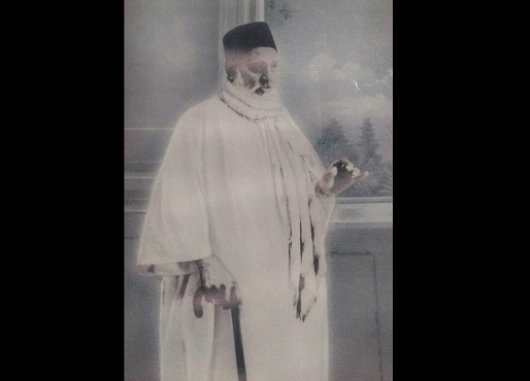Saturday, June 24, 2023
Muslim leader from Bengal and former Member of Parliament, Badrudduja, his life and times
Posted by
editor
at
12:58 AM
![]()
Labels: Badrudduja, Bangla, Bengal, Calcutta, India, Kolkata, Lok Sabha, Mayor of Kolkata, Muslim leaders of Bengal, Muslim MP, West Bengal
Sunday, June 06, 2021
Mulla Jan Mohammad: Prominent Muslim leader who played important role in post-independent era
Shams Ur Rehman Alavi
Mulla Jan Mohammad was among the leaders who played a vital role in post-partition era in India.
He was a known personality earlier too. But post-independence, it was a critical period.
Muslim masses who were looking for leaders, as top brass had left them and migrated across the border, found in him a man who was able to pick up pieces, help community pass through the troubled times.
Calcutta was not just the former capital of British Empire in India, but also, it was a prominent centre of Muslims. Though the top leaders had migrated, shifted to Dhaka, millions of Muslims remained in West Bengal.
The city had been rocked by riots before partition. After partition too, there were riots and killings. In this situation, leadership was needed. There was communalism apart from anxiety, apprehensions, institutions were facing several serious issues.
Among prominent leaders, Badrudduja Sb decided to remain in India. It was only until 1955 that the situation improved, well. So either the 1950 situation, that had once again heightened fears of Muslims in Kolkata, or the later disturbances in 1960s, Calcutta had the figure of Mulla Jan Mohammad, who became a symbol of hope and reassurance for Muslims.
Mulla Jan Mohammad had seen Ali brothers, the rise of Muslim politics and its fall, the consequences. He was a strong man, known for principles, steadfast, honest and self-less. Hence, he was termed Khadim-e-Qaum.
In 1961, Jabalpur riots shook the nation. The series of riots in cities in Eastern India, Kolkata, Rourkela, Jamshedpur, again hit the region. In these circumstances, just like in 1950, he remained active and also oversaw relief and rehab measures.
Either the 1963 and 1965 riots in Kolkata or the Ranchi, Jamshedpur and Rourkela incidents, that were clearly planned riots, horrific killings and large-scale destruction took place. He was instrumental in taking the politicians head on over the riots.
Calcutta Khilafat Committee (CKC) is one the most well-known institutions of Muslims. Mulla Jan Mohammad was its president. Also, his association with Islamia Hospital and serving the institution must be written with golden letters.
Following any riot in Kolkata, he would hit the street, take the lead, go out in the city, meet authorities, would also ensure rehab and relief. Disturbed by the series of major communal riots, Syed Mahmud took the lead and meetings of Muslim leaders, scholars, clerics were held.
Once again Mulla Jan Mohammad played a key role in formation of the All India Muslim Majlis Mashawrat. Apart from Syed Mahmud, Maulana Abulhasan Nadvi alias Ali Miyan, Mufti Atiqur Rahman Usmani, Ebrahim Suleiman Sait, Maulana Manzoor Nomani and veteran leaders were present.
The need for social, intellectual, community leadership is always needed. More so, in desperate times. Later too,Mulla Jan Mohammad mooted idea that there must be tours to riot-affected cities and areas.This was accepted and hence leading Ulema planned the tour.
The visit to Ranchi was a major success. Individuals who can unite, bring others on one platform, have community's trust, show way, keep others motivated and can act, are required in every society. Interestingly, the Peshawar-born Mulla Jan Muhammad, became 'Mulla' because Maulana Azad a regular visitor used to call him 'Mulla' lovingly.
"Ever since I can remember, from the time I was a student, I saw Mulla Jan Mohammad was always involved in community issues, redressing them and doing social leadership. He dedicated himself to serving the community", writes Abdul Aziz, in a column in Halaat-E-Bengal.
"The relationship was mutual, as top Muslim leaders of the country too kept him close. Despite his relations, he never let politics and politicians enter the institutions and damage them, and this is true for all these institutions viz. Islamia Hospital, Calcutta Khilafat Committee and Mohammedan Sporting Club", he further writes.
"The Calcutta Khilafat Committee came into existence around 1919. The Islamia Hospital was built a few years later. All his life, he remained attached to the hospital and rendered yeoman's service", writes Maulana Talha Bin Abu Salma Nadwi, in an article.
"In 1967, Mulla Jan Mohammed went for Haj. When he returned and came to know that hospital authorities had fixed 'aath annah' fee for outdoor patients, he was so angry, sat at the gate of the hospital, with this stick and returned the amount to each person who had come to the hospital and paid it", he mentions in the article.
[There was another person Khan Bahadur Sheikh Mohammad Jan, who was a different person though he also lived in the same period. He was a businessman, Congress leader and owned two newspapers. Some people get confused and a separate post would be written about him, later]



























